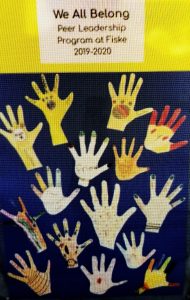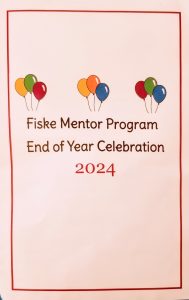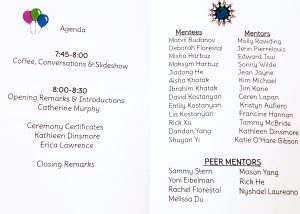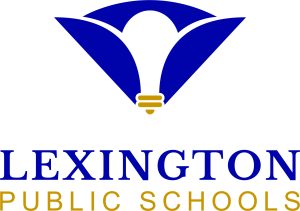
Fiske Mentor Program
The Fiske Mentor Program, Lexington Public Schools, MA, is an English Language Learner program, providing mentoring to “newcomer” elementary school students and peer leadership opportunities for former ELL students.
Vision
The Fiske Mentor Program, a program for English learners who are newcomers, in Lexington Public Schools, MA, provides mentoring and peer leadership opportunities to students in the English Language Education Program. The mentor program builds social relationships targeted at lowering the newcomer students’ affective filter and getting them ready to learn.
Newcomer students are matched with Fiske staff members as mentors, and mentors and mentees meet weekly for games, crafts, and casual conversation. The relationship is not about academics, or even about explicit language instruction, but with the goal of building a trusting connection within the school for the new student (and student’s family). The goal is to lower children’s “affective filter” so that they are more able to access instruction. Mentors, mentees, and the mentee’s parents are invited to events throughout the school year, including opportunities to meet other newcomer families, learn about the town of Lexington and the resources available, and to better understand the US school system and Fiske Elementary in particular.
As students move on from the “newcomer” status, they are eligible to become peer leaders in the program, partnering with mentors and mentees to expand student connections and inform the activities and direction of the mentoring program. Fiske staff volunteer to serve as mentors, and many share the positive impact the program has had on their own experience as an educator.
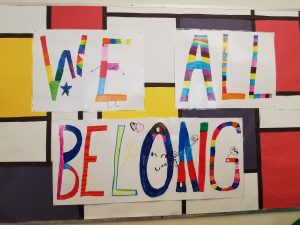
History
Each year Fiske Elementary School welcomes five to seven newcomers to the school community. These newcomers arrive with abilities in their heritage languages but are new to learning how to communicate academically and socially in English. According to the Massachusetts ACCESS assessment, these students are at a World-Class Instructional Design and Assessment (WIDA) levels 1 or 2 (out of 6 levels). Second Language Acquisition Research shows that students who come to the U.S. as a newcomer experience culture shock, which raises their “affective filter,” a phrase that describes anxiety, self-consciousness, low self-confidence, and/or negative attitudes to learning that may work in combination to inhibit newcomer students’ language acquisition and inhibits their ability to learn.
In 2012, ML educator Catherine Murphy was working with two newcomer students from Israel. In an effort to reduce the students’ affective filter, she asked a math coach to have a weekly lunch date with the students – to keep things fun and casual, not another academic time, for the girls to feel more comfortable in the school and build confidence. From the impact of that first experiment, Mrs. Murphy envisioned the Mentor Program, and began to informally pair newcomer students with willing mentors. In 2016, she wrote a grant to the Lexington Education Foundation to fund the official project launch, supporting 5 staff mentors for 7 newcomer students. Mrs. Murphy and her team of mentors held two community meetings with the families and the mentees that year. Students and parents appreciated the project and classroom teachers reported that their newcomers adjusted well to their environment. In data meetings with staff, classroom teachers remarked several times about how the mentoring had positively affected their newcomers; for example, they were more willing to produce oral language in the classroom, typically not found as rapidly without the program.
The following year, Mrs. Murphy obtained another grant to continue and expand the program, adding a third parent meeting and beginning the inclusion of peer mentors- students who had participated as newcomers in the program, coming back in a leadership role to support current newcomers. Over the years, Catherine has offered space for, and/or facilitated, opportunities for districtwide staff to learn about the Fiske Mentor Program, and to share best practices and support in launching similar mentor programs at other elementary schools in the district. Now, three out of our six elementary schools offer a mentoring program; some have followed the Fiske model of serving newcomer multilingual learners in particular, while others have expanded to include all new students to the school in a given year, or to assign mentors to students based on a referral process where being new to the community is just one factor considered. The program continued serving students through the pandemic, with Mrs. Murphy securing grant funding to create send-home activity bags and develop online mentor activities. Weekly mentor sessions happened via Zoom, and the virtual parent meetings had such a great turnout that the team has continued to hold the winter parent meeting via Zoom to increase accessibility.
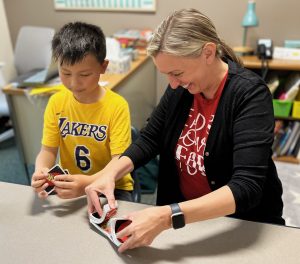
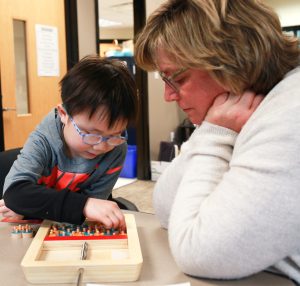
Activities
Program Preparation:
- Feedback is collected from mentors, mentees, and mentee families about the program, and reviewed for takeaways/improvements in the upcoming year.
- Summer work is completed annually to update program information, details, and plans for community events
- Create calendar for the year,
- After reviewing surveys of mentors and families, discuss successes of the program and how we can improve ,i.e. adding an in-school event to our peer mentor program.
- Reach out to administrators to collaborate on any program changes and to review the calendar of events
During the school year:
- Every fall and spring solicit interest and give training in mentoring from school staff. Invite staff to a luncheon during their lunch breaks to learn about the mentor program. Have prospective mentors attend an orientation by the Fiske Mentor Program committee members, and train the mentors.
- Match mentors to mentees
- Collaborate with classroom teachers and related service providers to identify a time in the mentee’s schedule where weekly mentoring can happen.
- Reach out to families to explain this optional mentor program, and determine if the family wants to opt in to the mentor program.
- Mentors and mentees meet weekly for 30 minutes for casual play and conversation. Popular mentor/mentee activities include shooting hoops in the gym, making friendship bracelets, playing board games, creating artwork, etc.
- The leadership team supporting the Fiske Newcomer Mentoring Program organizes three community meetings a year that include mentors, mentees, families and administrators.
Fall Meeting: Introduce the families and students to the mentors and the committee members. We break up the groups into students/mentors and committee members/families. These groupings provide students and mentors with time to get to know each other in a group setting. In a different group, the committee members engage with parents to learn more about their needs, and to inform them about our school community. Guest speakers might include the nurse, librarian or social worker.
Winter Meeting (virtual): We provide time for introductions, and to get to know one another. The peer mentors are involved in planning this event, and typically help to lead an online game such as a scavenger hunt.
Spring Meeting: End of year celebration, where student newcomers, student mentors, staff mentors, families, and district leaders are invited. There are a few remarks about the program, and then mentees present mentors with a gift of appreciation (gift handmade by the student leaders or provided by the district, and mentors make a short statement about the time they have spent with their mentor.
Other considerations:
At different times in its tenure, the Fiske program provided opportunities for mentors to meet regularly and share best practices and problem-solve any challenges collaboratively. Over the years, the program has created documents that compile mentoring activities, ideas, and other supports for mentors to use.
The budget considerations for this program include providing art supplies, games, and other materials for mentors and mentees to use; printing costs for community events (flyers, mailings, agendas); teacher/staff time to lead/attend the mentor training; program coordinator stipend to facilitate matches, communicate with families, organize community events, etc.
Audience/s Served
- The mentees are “Newcomer” students – students who are new to the school community. They are typically assessed to be at a WIDA Level 1 for English language proficiency, and /or may have transitional challenges (i.e. refugees)
- Families of newcomer students have three community meetings annually to make connections across families and school staff and share information about the school and town.
- Graduates of the mentoring program, who are tapped to be “peer mentors” provide advisory input on the program, support the mentees as trusted peers, and create resources for use in the program. For example, a current peer mentor project is recording audiobooks in various languages – the students translate a text, then record their reading of it, for use by newcomer students.
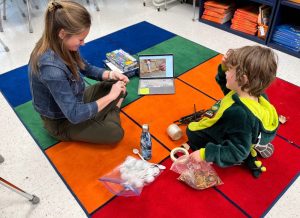
Impact
- Since the Fiske Mentor Program’s official launch in 2016 up through 2024. 62 students participated as newcomers, and 38 members of the Fiske faculty have served as mentors. Thirty-seven of these students have continued on to become peer leaders in the program.
- Three of the six Lexington elementary schools have established their own mentoring programs, replicating or adapting the style of the Fiske Mentor Program.
- Qualitative feedback from teachers credit the program with supporting newcomer students to more quickly build connections with other students and staff within the school, and building their confidence in producing oral language in the classroom setting more quickly
- Parents/families of newcomer students in the program have shared very positive feedback about the program’s impact on their child’s readiness and attitude around school engagement. Parents often share stories at community events that demonstrate how their child has managed very big changes (new language, often new home/town/country) with the support of the Fiske school community, and particularly the Newcomer Mentor program.
- Mentors report that their weekly mentoring sessions are joyful and often the best part of their week. Routinely we see mentors connecting with their mentees as they walk through the school halls and give a wave. As the ML teachers we see the joy in both the mentor and mentee when they meet outside of their sessions such as all school meetings, or recess.
Recommendations for replication and or/adaptation
- Recognition of all participants is important. Events such as a year-end celebration of student mentees, student mentors, teacher volunteer mentors, parents, and administrators creates opportunity to talk about the program, present and future.
- Regular interactions with parents can include emails, regular meetings in- person and virtual to share ideas.
- Program preparations is important for all participants:
- Orientation for mentors to include program goals, setting expectations, review of activities, how to work with English language learners
- Surveys throughout the year are an effective way to identify program needs
- Orientation for parents and children
- The “peer mentor” concept and implementation has proved to be very successful…a win-win for the newcomers and student leaders
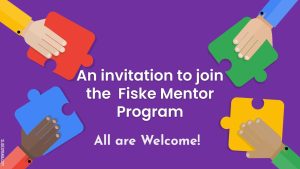
View the slide presentation of the Fiske Mentor Program Orientation Program 2023-2024
Copy of Fiske Mentor Program Orientation 23-24
Contact:
Catherine Glennon Murphy
ESL Educator
Fiske Elementary School
55 Adams Street
Lexington, MA 02421
781-541-5001
camurphy@lexingtonma.org
